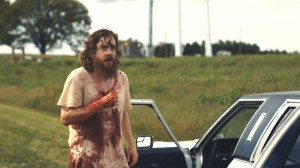‘Blue Ruin’ redeems the revenge thriller
While star-studded Kickstarter projects such as Zach Braff’s Wish I Were Here and the Veronica Mars movie received millions of dollars and the bulk of the media’s attention in the summer of 2012, hardly anyone noticed when writer-director Jeremy Saulnier reached his modest funding goal of $38,000 and quietly began work on his second feature, the oft-told tale of a man seeking justice for the death of his loved ones. Yet, in spite of its miniscule budget and familiar premise, Blue Ruin is the first unqualified triumph of crowd-funded cinema, a bloodstained gem that cuts through the shallow glories of vigilantism to reveal both the futility and grotesquerie of revenge.

Vengeance is his · Dwight (Macon Blair) returns after years of homeless exile to hunt down the man responsible for his parents’ murder in Jeremy Saulnier’s crowd-funded Blue Ruin, which opens in theaters and VOD today. This revisionist thriller is fueled by the contrast of the low-key anti-hero and the chaos he incites. – Photo courtesy of The Weinstein Company
When we first meet Dwight, played by the superb Macon Blair, he’s a disheveled beach bum living out of the titular blue ruin: an ancient, rust-bitten Pontiac Bonneville distinguished by a set of barely concealed bullet holes. The opening scene finds him breaking into an unoccupied house for a much-needed bath and a change of clothes. He’s become something of a fixture at the local boardwalk, where he spends his days in a state of catatonic oblivion, his beaten-dog eyes still brimming with the terrible knowledge of the event that brought him to this pitiable state. He seems unbalanced but essentially harmless, a lump of human driftwood waiting to be reclaimed by the sea. All that changes, however, when a curiously accommodating policewoman informs him that his long vigil is over: The man convicted of killing his parents is finally being released from prison.
Filled with the shambling purpose of a reanimated corpse, Dwight returns to his quaint Virginia hometown, intending to finish what the legal system couldn’t. Within the film’s first half-hour, he tracks down his intended target, the vile Wade Cleland (Sandy Barnett) and, in a scene that would be the climax of most revenge flicks, corners him in a bathroom and, after a brief struggle, succeeds in planting a knife in his skull. Yet in the sage words of Hattori Hanzo (Sonny Chiba) in Kill Bill Vol. 1, “Revenge is never a straight line. It’s a forest.” Sure enough, the rest of the gun-toting Cleland clan begins threatening the life of Dwight’s beloved sister Sam, (Amy Hargreaves), a suburban mom with two young daughters. The rest of the film unfolds as a widening gyre of violence and madness, ending with a bloody crescendo that echoes the workmanlike nihilism of Sam Peckinpah.
By the end of Blue Ruin, one thing is abundantly clear: Our bedraggled anti-hero simply isn’t cut out for life as a vigilante. He lacks the coiled menace of Charles Bronson’s Paul Kersey or the righteous, Valkyrian fury of Uma Thurman’s The Bride. His often-staggering ineptitude works to the film’s advantage, however, infusing every scene with the trembling semblance of reality, such as when he forgets his keys in the bathroom after killing Wade or the sequence where he steals a gun from a roadhouse trucker only to be thwarted by a simple safety lock.
The film’s cast is one of its greatest assets. Despite his increasingly murky motivations and the fact that he barely says a word for the majority of the movie, Dwight makes for a weirdly compelling protagonist, his bland features and sheepish demeanor contrasting nicely with the mayhem that seems to follow him wherever he goes. His brief interactions with Hargreaves’ Sam range from darkly funny to genuinely poignant, especially when she lays into him for abandoning her in the wake of their parents’ death, saying, “It’d be all right if you were crazy. But you’re not crazy. You’re just a coward.”
Then there’s Devin Ratray’s welcome turn as Dwight’s childhood friend Ben, an amiable metal-head who helps arm his buddy for his final firefight with the Clelands. The New York native, who also stole the majority of his scenes as one of Will Forte’s slack-jawed cousins in last year’s Nebraska, is quickly proving himself an invaluable character actor. The Clelands themselves are also made up of some famous faces, including a nearly unrecognizable Eve Plumb — better known as Jan Brady from The Brady Bunch — and Kevin Kolack as a motor-mouthed hillbilly assassin who winds up spending the bulk of his screen time trapped in Dwight’s trunk.
From its hypnotic early moments to its lead-poisoned finale, Blue Ruin is a minimalist marvel of tight pacing, lean plotting and carefully ratcheted suspense. In many ways it functions as the antithesis of glossy, predictable revenge thrillers such as Taken and Colombiana, where viewers are invited to cheer on the actions of the avenging protagonist unreservedly.
Saulnier has taken the well-worn tropes of the vigilante movie and stripped them down into something raw and elemental. What remains is a grim exploration of the cyclical nature of payback, an uncommonly bleak film punctuated by moments of macabre humor worthy of comparisons to John Hillcoat’s The Proposition and the Coen Brothers’ masterful debut, Blood Simple. This is brilliant, top-shelf filmmaking from a director who’s clearly just getting started.

